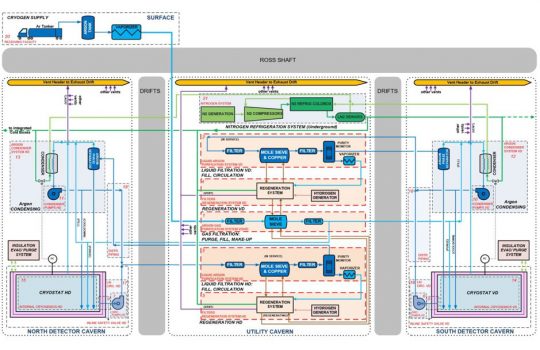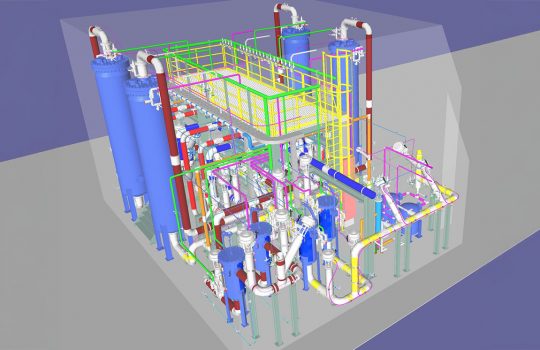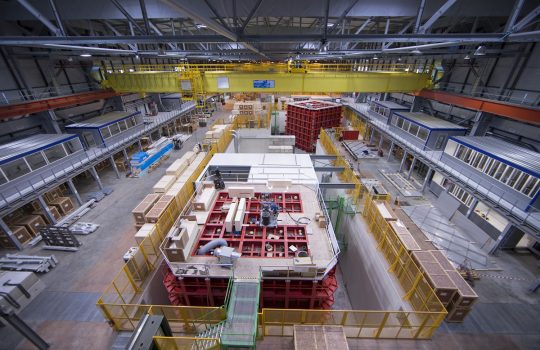While the refrigerator in your kitchen gets cold enough to prevent your leftovers from spoiling, dilution refrigerators used for quantum computing research cool devices near the coldest physical temperature possible. Now at the U.S. Department of Energy’s Fermi National Accelerator Laboratory, researchers are building Colossus: It will be the largest, most powerful refrigerator at millikelvin temperatures ever created.
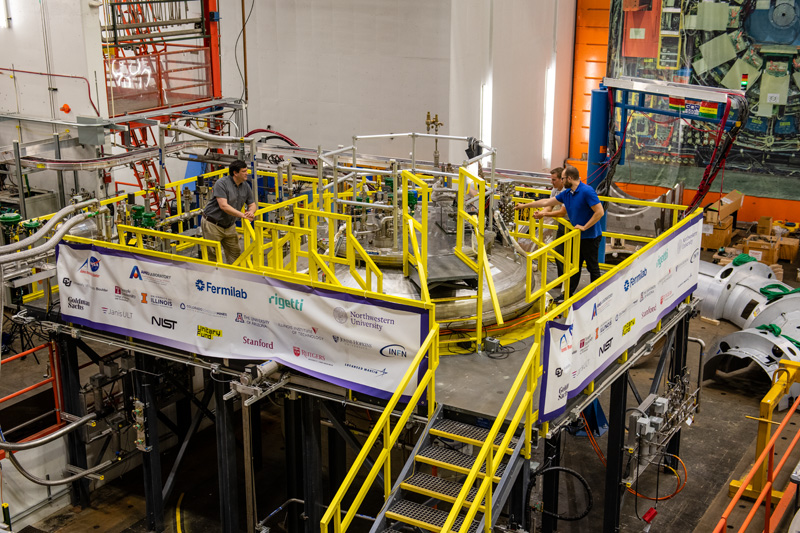
Colossus will offer 5 cubic meters of space and cool components to around 0.01K. Photo: Ryan Postel, Fermilab
Fermilab is known for its massive experiments, and Colossus will fit right in. Researchers from the Fermilab-hosted Superconducting Quantum Materials and Systems Center need lots of room at cold temperatures to achieve their goal of building a state-of-the-art quantum computer.
Unlike a kitchen refrigerator, which compresses gases called refrigerants to cool food, a dilution refrigerator uses a mixture of helium isotopes to create temperatures close to absolute zero, or zero kelvin: the coldest temperature imaginable in physics, which is physically impossible to reach.
“With the cooling power and volume that Colossus will provide, SQMS researchers will have unprecedented space for our future quantum computer and many other quantum computing and physics experiments,” said Matt Hollister, the lead technical expert on this project. “Colossus is named after the first electronic programmable computer, which was constructed in the 1940s for codebreaking. It was a historic milestone in the history of computing and seemed like an appropriate name for the size of our new refrigerator.”
SQMS scientists and engineers are tackling a challenge called quantum decoherence. Decoherence is a phenomenon that occurs when quantum information is obscured by signal noise or lost through the materials that make up the physical qubits, the basic units of a quantum computer.
The metallic, niobium cavities used by SQMS to develop better physical qubits are rooted in Fermilab’s renowned particle accelerator program. The lab’s expertise in superconducting cavities and cryogenics, essential in building modern, powerful particle accelerators, made Fermilab a prime location for hosting one of DOE’s national quantum information science research centers.
“Once we accomplish our goal of building this massive machine, we look forward to seeing the incredible physics and quantum computing experiments our fellow researchers have planned with Colossus.” – Matt Hollister, project lead technical expert
To make a quantum computer, researchers don’t just need high-quality qubits connected to each other, they also need a large quantity of these devices, too.
Most dilution refrigerators that operate at millikelvin temperatures offer only a fraction of the space compared to Colossus, which makes scalability a big hurdle for constructing a useful quantum computer. Colossus will be so large that it will be able to house hundreds to thousands of highly coherent cavities and qubits.
The new dilution refrigerator will be constructed around a repurposed facility originally used to test components for Fermilab’s Mu2e experiment at temperatures around 4K. When Colossus is fully built, it will offer 5 cubic meters of space and cool components to around 0.01K. That is 10 times the cooling power and 15 times the volume at that temperature than standard commercial dilution refrigerators.
“At SQMS, we use metallic cavities made of superconducting materials to perform our research. Superconducting materials are great at storing electromagnetic energy with very low losses, but the big caveat is they must be very cold,” Hollister said. “Thankfully, we are constructing a space to store hundreds to thousands of cavities and qubits, depending on the geometry and sizes of course.”
The construction of Colossus faces many challenges related to its large diameter of around 2 meters. Like an upside-down wedding cake, around seven plates with smaller and smaller diameters and lower and lower temperatures will be suspended from each other and will form the cryogenic structure of Colossus.
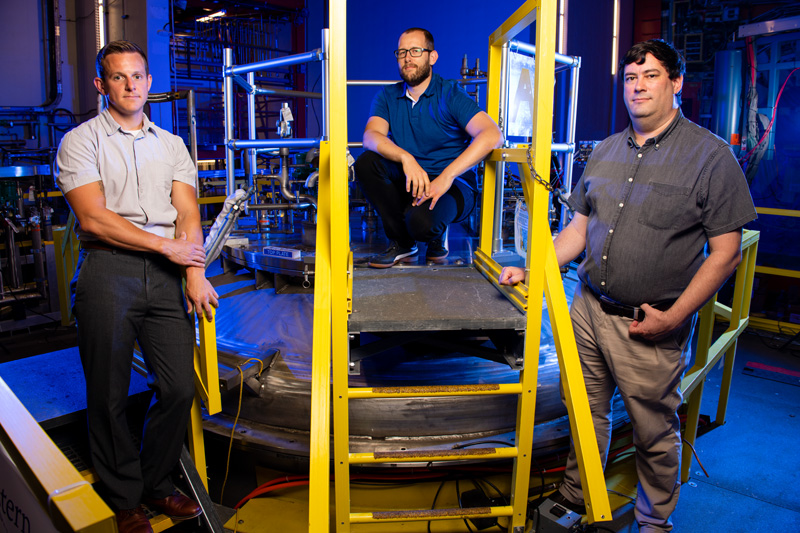
From left to right: Chris James, Grzegorz Tatkowski and Matt Hollister stand on top of the re-purposed cooling tank for Colossus. Photo: Ryan Postel, Fermilab
“A dilution refrigerator of this size-scale has never been built before. This presents numerous technical challenges our team is working through,” said Grzegorz Tatkowski, an SQMS cryogenic engineer. “We are designing Colossus for a rather large payload in terms of mass, and ensuring each plate reaches the right temperature specifications needed for this project is a challenge.”
To build it, technicians will repurpose the cryogenic plant and a control room originally used for the famed Collider Detector at Fermilab experiment, which provided data for researchers to discover the top quark and also provided a recent measurement on the mass of the W-boson.
“This is a much different cryogenics challenge than what I faced when I worked in the Neutrino Division at Fermilab,” said Chris James, a cryogenic engineer. “There we were working with massive tanks that could hold several tons of ultra-pure liquid argon to detect tiny particles called neutrinos. Here I am working with liquid helium that is around 0.01K, which is around 10,000 times colder than liquid argon.”
To finalize the design and specifications of Colossus, the SQMS team conducted an in-depth review process on the components for the fridge. The team expects to start major procurements in summer 2023.
“Once we accomplish our goal of building this massive machine, we look forward to seeing the incredible physics and quantum computing experiments our fellow researchers have planned with Colossus,” said Hollister. “The Colossus team is excited to build a first-of-its-kind machine to enable our upcoming experiments and create computational devices that will advance knowledge and capabilities.”
The Superconducting Quantum Materials and Systems Center at Fermilab is supported by the DOE Office of Science.
The Superconducting Quantum Materials and Systems Center is one of the five U.S. Department of Energy National Quantum Information Science Research Centers. Led by Fermi National Accelerator Laboratory, SQMS is a collaboration of 23 partner institutions — national labs, academia and industry —working together to bring transformational advances in the field of quantum information science. The center leverages Fermilab’s expertise in building complex particle accelerators to engineer multiqubit quantum processor platforms based on state-of-the-art qubits and superconducting technologies. Working hand in hand with embedded industry partners, SQMS will build a quantum computer and new quantum sensors at Fermilab, which will open unprecedented computational opportunities. For more information, please visit sqms.fnal.gov.
Fermi National Accelerator Laboratory is supported by the Office of Science of the U.S. Department of Energy. The Office of Science is the single largest supporter of basic research in the physical sciences in the United States and is working to address some of the most pressing challenges of our time. For more information, please visit science.energy.gov.

